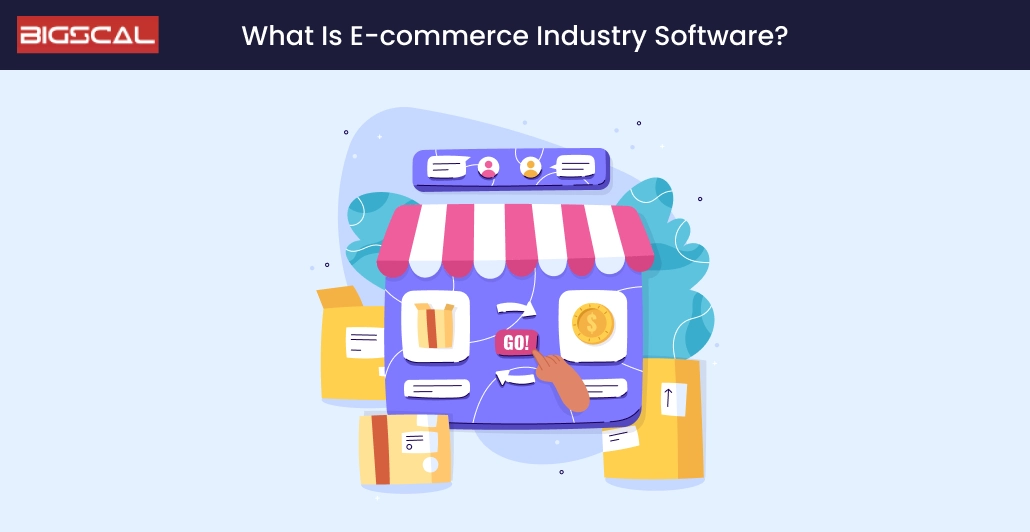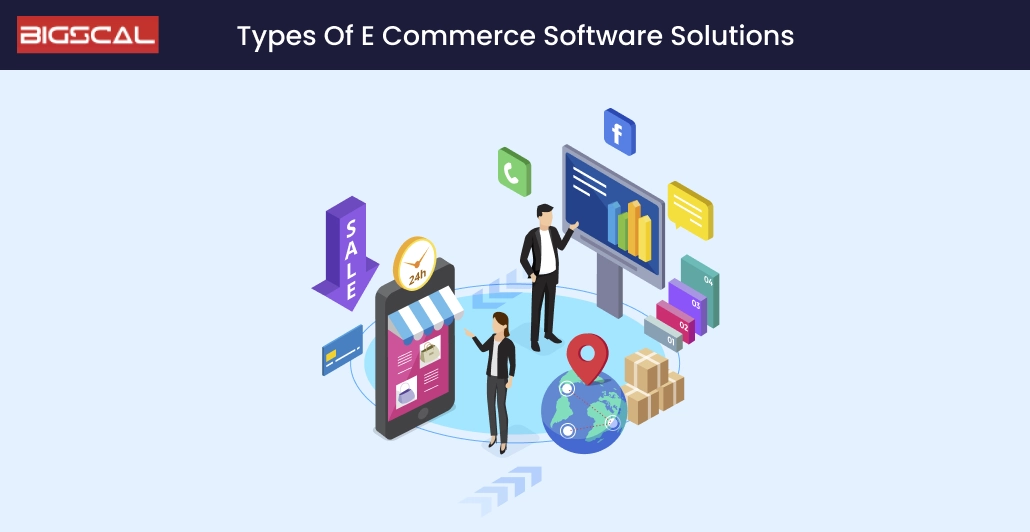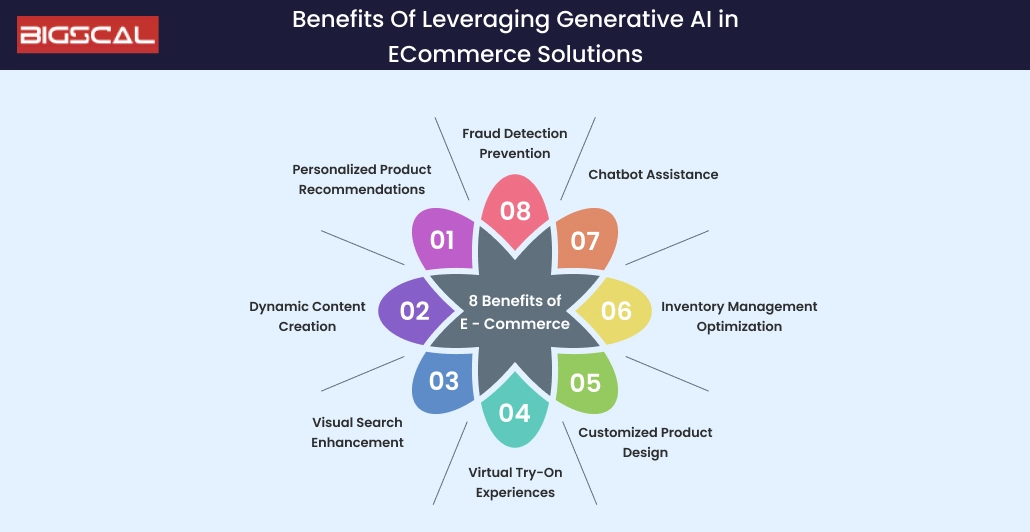Top Benefits Of Using Generative AI In Ecommerce Software
Quick Summary: Shopping experience is no more difficult with the integration of Generative AI in Ecommerce solutions. So, if you are owning an E commerce firm then you also must implement AI technology. It will benefit your business operation in various ways and enhance customer interactions. We will discuss all the benefits in this article, so read it on!
Introduction
In the bustling world of eCommerce Development Services, where innovation reigns supreme and competition never fails. AI is the tool that stands out like a beacon of creativity and efficiency. A virtual assistant relentlessly creates product descriptions that customers believe. It creates animations that jump off the screen, and even wears trends predicted before the main events. Welcome to the revolutionary Generative AI in e-commerce software.
Gone are the days of mundane tasks bogging down creative minds; With Generative AI, the possibilities are as limitless as the digital landscape. Imagine an algorithmic trend, seamlessly integrating customer data tailored to personalized shopping experiences. It optimizes pricing while optimizing inventory management with unparalleled tasks. From automating common tasks to enhancing customer engagement.
Wanna know more about the benefits of integration of AI in e-commerce? Then….
Unlock the power of tomorrow’s shopping experience with Generative AI in e-commerce software. Just by reading this article!
In this blog, we will explore the top benefits of using Generative AI capabilities in eCommerce software. As we explore how this revolutionary technology is reinventing the online shopping experience. It is driving sales and enhancing customer loyalty in the online shopping world like never before.
What Is E-commerce Industry Software?

E-commerce industry software refers to the digital tools and platforms that companies use to manage their online marketing business. These software solutions help companies build, operate and optimize their online stores to sell products or services to online shoppers.
At its core, ai solutions or e-commerce software often includes various amazing features. These are such inventory management, order processing, payment processing, customer relationship management (CRM) etc. Again also, it can provide services such as website design templates, marketing tools, analytics, integration. And other business processes such as accounting software or shipping products.
For businesses, e-commerce software simplifies online sales. It makes it easier to manage inventory, process orders and communicate with customers. Additionally, it provides a centralized location where businesses can showcase their products. It accepts payments securely, tracks sales trends, sees historical sales data and analyzes customer behavior to make data-driven decisions.
Specifically, e-commerce business software empowers businesses to establish and grow their online presence, reach more people, and ultimately drive sales and revenue in the digital marketplace.
Types Of E Commerce Software Solutions

E-Commerce Platforms
This software allows businesses online retailers to add shopping cart functionality to their websites. This allows customers to select and buy products. Popular options include the Shopify Lite system, WooCommerce, and BigCommerce.
Shopping cart software
This software allows businesses online retailers to add shopping cart functionality to their websites, allowing customers to select and buy products. Popular options include the Shopify Lite system, WooCommerce, and BigCommerce.
Payment gateways
Payment gateway software facilitates secure online transactions by processing customer payments. Examples include PayPal, Stripe, Square, and Authorize.Net.
Inventory management software
This software helps businesses manage their stock levels, manage inventory, and manage order fulfillment. Examples include TradeGecko, QuickBooks Commerce, and Cin7.
Customer Relationship Management (CRM) Software
CRM software enables companies to manage customer interactions, track leads, and analyze customer data. It improve marketing and sales efforts. Examples include Salesforce, HubSpot, and Zoho CRM.
Marketing automation software
This software performs marketing tasks such as email campaigns, social media postings, and targeted advertising. This is to attract and retain customers Examples include Mailchimp, Klaviyo, and ActiveCampaign.
Analytics and Reporting Software
Analytics tools help businesses make informed decisions by monitoring website traffic, sales performance, and customer behavior. Examples AI tools include Google Analytics, Adobe Analytics, and Shopify Analytics.
Overview To E commerce Artificial Intelligence
Currently AI is one of the factors which are noticeable changing how businesses operate. Essentially, eCommerce AI involves a collection of technologies which are intended to enhance user experiences. It also makes processes efficient, and increases sales. Better visualization is to introduce a sales funnel for SEO that can further enhance this process by guiding users through tailored content at each stage of their journey, from initial discovery to final purchase, making recommendations more effective and aligned with user intent.
Furthermore, AI-enabled chatbots can facilitate the virtual assistants to help customers. It gives them answers and technical instruction but also allow them to make the purchases without delay. These chatbots apply NLP to capture the meaning of the customers’ questions better. Thus, they will find a better solution for the customer’s needs.
Besides, e-commerce AI predicts demand which helps. It make sure that there are optimal stock levels so that overstocking or stockouts problems are being avoided. Because of that, the supply chain effectiveness and efficiency is improved and so are the costs traded on the jobs.
Additionally, AI contributes to optimization enterprises’ security, intelligence, and clients’ customer transaction safety, and data protection. Machine learning has helped e-commerce platforms as they can now process huge amounts of data to detect fraud. It reduces risks, and protects businesses and consumers from fraud.
Moreover, AI-backed E-commerce enables companies to provide personalized experience. They streamline operations and risk management and ultimately, drive growth as well as competitiveness in the digital playing field.
Benefits Of Leveraging Generative AI in ECommerce Solutions
Here are some benefits of leveraging Generative AI Robotics into your E Commerce businesses. Check it you:

Personalized Product Recommendations
The presence of AI in e-commerce is the new frontier in the creation of a personalized product recommendations and a key feature of the service. A huge number of data, such as consumer homepages, browsing history and consumer habits, can be studied by generative AI which in fact analyze market trends on the individual levels. Thus, it becomes easy to be served to the extent people can occupy more employees to give the still personal service, and the recommendation of the items that fit each user individually.
With the passage of every year, this generation AI moves upwards by means of sophisticated machine learning mathematics. The ones have also been programmed to be responsive to data, and as a result, recommendations are refined and enhanced by using real-time information about users. Market approach that involves granting customers with an opportunity to voice their concerns, interests, and needs can be said to be almost ideal for customer satisfaction and sales since the approach is close to the exact expectations of the customers, particularly indirectly and directly. Lastly, e-commerce websites which have a personalized recommendation engine can specifically build this strong customer loyalty and in the end very enthusiastic customer commitment because end users can easily identify that what the site has been made with their interests in mind.
Dynamic Content Creation
Generative AI is radically transforming the nature of information warehousing in a manner that is capable of making larger volumes of transactions not simply achievable, but actually entertaining. Contrary to classical methods of information development which are time-consuming and almost impossible to improvise along with the understanding, traditional strategies cannot meet the needs of today’s world. However, thanks to the generative AI, an eCommerce platform can do that with a much larger range of content, the type of which can be article-based, product descriptions, social media posts, AI-generated video and others.
Human language analysis and deep learning in AI make generative algorithms able to process semantics and context of the content, thus providing the creation of context adequate, high quality content. The processing of information is on the one hand facilitated but on the other hand accuracy and consistency are improved, too, being that the generation of content is done across all communication channels.
Besides, generative AI endows eCommerce techniques with the ability of changing relevant information based on the fact that users are real-time and may develop some preferences, the market tends, and other contextual factors that come into picture. This flexibility helps business organizations to be ahead of the others and provide users with more appealing and matching relevant information.
Visual Search Enhancement
Generative AI in eCommerce offers unique visual search options which are level up in terms of its capabilities than earlier ones. By high-end algorithms as well as deep learning, the systems can look inside images and extract meaning, and also context. This gives users by the ability to use the actual image instead of its text-based counterpart, leading to the fact that search results are a lot more accurate and quicker.
The visual search works here in that the customer can simply take a photo or upload a picture of items they are interested in and AI will identify equivalent ones from catalogs of as well as online store websites. This makes the search process both simple and easy for the users who may be having difficulties in describing what they want in words. As well as that, it lets users know the products that suit best their tastes despite the inability to describe their preferences appropriately.
This innovation can be useful than just making the content more convenient. It also makes discovering relevant content and engaging with users significantly improve conversion rates. The fact that this contributes to retailers collecting data that provides details about customer preferences and behaviors can also be used to enhance personalization of recommendations and improved inventory selection.
Virtual Try-On Experiences
Generative AI enables immersive tasting experiences, transforming the way consumers shop for fashion and beauty products online. Using computer vision and other machine learning algorithms, e-commerce platforms can virtually simulate how things will appear to the individual user.
Virtual try-on experiences allow consumers to visualize what clothes, makeup, or makeup looks like on their body or face. This eliminates the potential customers need to go to the store. It increases their confidence in the purchase decision, leading to lower profitability and higher customer satisfaction.
In addition, virtual try-on experiences can be customized to individual preferences, such as style, fit, and skin tone, offering personalized recommendations to resonate with each customer. This level of customization not only for purchases the experience is enhanced but also brand loyalty and engagement makes it stronger.
Customized Product Design
Generative AI in e-commerce solutions is changing the way businesses do manufacturing by delivering personalized experiences to customers. Through sophisticated algorithms, AI is able to analyze vast amounts of customer data. It includes preferences, browsing and purchase history, and purchase behavior, to create customized product recommendations.
Leveraging generative AI, businesses can offer customizable choices to customers of products to their unique tastes and needs You can personalize. This customization enhances customer satisfaction and reinforces brand loyalty, as consumers feel a deeper connection with products that align with their personal preferences.
Additionally, generative AI enables businesses to streamline the process, reducing time-to-market and manufacturing costs. Automating design iterations based on customer feedback and market trends enables companies to quickly adapt to changing customer needs. Using an automation tool such as an AI form builder can help you create feedback forms easily. With that they can stay ahead of the competition. Moreover, integrating generative AI into eCommerce solutions doesn’t necessarily provide an overall shopping experience. It not only promote businesses to connect their target audiences.
Inventory Management Optimization
Effective inventory management is essential for eCommerce businesses to meet customer needs and reduce overhead costs. Generative AI will play a key role in optimizing inventory management by providing accurate demand forecasts and inventory recommendations. By analyzing historical sales data, market trends and external factors, AI algorithms can accurately predict future demand. It enables businesses to maintain optimal stock levels and avoid stockouts or excess inventory.
Additionally, generative AI facilitates the adoption of dynamic pricing strategies based on real-time market conditions and consumer behavior. By aggressively changing prices, companies can maximize profits while remaining competitive in the marketplace. Additionally, AI-driven insights help businesses identify slow-moving or obsolete inventory so they can implement targeted improvements or redundancy strategies to reduce their losses.
Chatbot Assistance
Generative AI in e-commerce solutions is transforming customer service with the help of chatbots. These AI-powered bots are able to engage customers in real-time conversations. It provides instant answers to questions, and provides personalized recommendations based on users’ browsing and purchase history.
Moreover, generative AI-powered chatbots can handle multiple customer queries simultaneously, reducing response times, ensuring round-the-clock availability. They can provide dynamic support to customers when searching for products. When consuming products after the order, troubleshooting, and even during receipt. Additionally, these chatbots can learn and improve over time, refining their feedback and recommendations based on feedback and interaction data.
Fraud Detection and Prevention
Generative AI plays a key role in enhancing fraud detection and prevention strategies on e-commerce platforms. By analyzing large amounts of interaction data in real time, AI algorithms can identify patterns and anomalies that indicate fraudulent activity with greater accuracy.
These AI systems can identify suspicious behaviors such as unusual purchase orders, incorrect payment methods, or mismatches between shipping and billing addresses. Furthermore, through devices with the addition of learning algorithms. These systems can detect and adapt to new fraud patterns as they emerge , staying ahead of evolving threats.
Wanna Develop an Ecommerce Software With AI? Approach Bigscal Technologies
After reading such benefits of integration AI into Ecommerce Software You might want to use it in your business. So, Say goodbye to common product recommendations and hello to personalized magic!
Ready to enhance your customer’s experience Integration of AI in eCommerce business? At Bigscal Technologies, we’re not just building software; We’re creating experiences that redefine the way people shop online. We excel in creating an e-commerce platform embedded with the power of AI. It anticipates customer needs with ease, increases user engagement and it increases sales like never before.
With our expertise, we don’t just meet expectations; We are beyond them. With our software you can greet your customers with product recommendations based on their preferences. You can answer their questions instantly with an AI-powered virtual shopping assistant. Our software isn’t just about transactions; It’s about connecting with your audience and creating lasting relationships.
We understand the nuances of eCommerce like no other, and we’re ready to tailor a solution specifically for you. Whether it’s streamlining inventory management, streamlining procurement, or implementing dynamic pricing strategies, we’ve got you covered.
So, if you’re ready to embark on this exciting journey of innovation and growth, let’s work together.
Conclusion
When generative AI is integrated into e-commerce software, it offers many benefits that can transform the online shopping experience. From personalized product recommendations, personalized marketing campaigns, to inventory management and enhanced customer service, the possibilities are endless with AI. Generative AI enables companies to tailor product recommendations to individual tastes, predict trends, and even create unique programs. It’s like having a personal marketing assistant who knows your style better than you do. Embrace the future of retail and be flexible in the way you interact with your customers!
FAQ
How can AI personalized shopping experience can enhance experience?
AI can improve the shopping experience by analyzing customer data to provide personalized recommendations. It predicts preferences, streamlining product searches. Hence, it provides virtual tryout options, and providing pricing and promotions encouragement has been good.
How does Amazon use artificial intelligence in ecommerce?
Amazon uses AI in e-commerce with recommendation systems, personalized product recommendations, inventory management, fraud detection, shipment optimization. Alexa combined for automated voice shopping and customer service interactions.
Can AI make more efficient sales process?
AI can streamline the sales process by automating repetitive tasks, analyzing customer data and tailoring it to transactions. It provides real-time insights into sales decision making variety, facilitating appropriate communication with prospects and customers.
How does Shopify use AI?
Shopify uses AI for personalized product recommendations, chatbots for customer support, order fulfillment optimization, fraud detection, inventory management, and data analytics to help merchants make informed business decisions.
How can AI be used to run online business?
AI can enable online businesses to automate repetitive transactions. It optimizes marketing strategies through data analytics, delivering personalized customer experiences, inventory management, fraud detection, and streamlining logistics and customer service processes.





